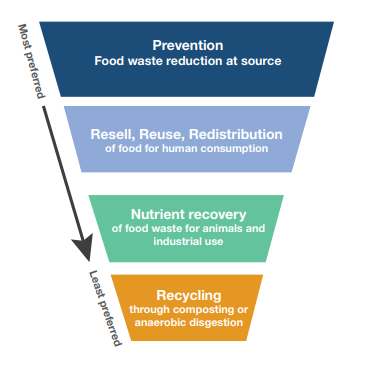A look at IWMI’s work on the International Day of Awareness of Food Loss and Waste.
by Tania Perera, Senior Communication Specialist

In 2022, nearly 800 million people faced hunger. This figure has been increasing slowly in the last decade and is likely to continue to rise. Meanwhile, an estimated 13 percent of food is lost as it moves along the supply chain from the producer to the consumer, with another 17 per cent lost at the retail and consumption level. So, tons and tons of edible food are not reaching people in need of it with the loss and waste contributing to environmental pollution and climate change. It is not only a waste of food but also of the water and nutrients used to produce it. A particular challenge for most countries is the collection of mountains of organic waste eventually ending in city landfills where they release greenhouse gases into the atmosphere. Better food waste management from reduction to resource recovery is therefore an important target of the circular economy.
Scaling the food waste hierarchy: Composting
Turning biodegradable waste, such as food waste, into compost helps to reduce emissions and recover plant nutrients. Composting is the fourth tier of the hierarchy of actions to prevent and divert food waste. Above it are the use of food waste as animal feed (tier three) and the distribution of still edible but not marketable food (tier two). The prevention of food waste is at the top of the hierarchy as the most preferred.

The International Water Management Institute (IWMI) has championed composting of organic waste, which is 90% food waste, as a sustainable waste management practice in the Global South for the past 20 years. In Sri Lanka, IWMI has assisted environmental and local authorities to produce nutrient-rich organic compost that is easy to handle, store, and transport. Turning organic waste into nutrient-rich soil decreases the use of commercial fertilizers, improves soil composition/fertility, while reducing the methane generated by landfills and dumpsites. Every improvement towards a circular economy drives progress in public health and livelihoods and environmental sustainability, including better water quality.
Harnessing food waste for animal feed
Most food waste is a palatable source of nutrients for animals, offering a cost-effective means of feeding livestock, disposing waste, and minimizing the environmental impacts of food waste. A 2022 IWMI study on food waste and swine farming in Sri Lanka found that the informal partnerships between peri-urban piggeries and the food service sector in the capital Colombo represented a success story of a circular economy business model. The arrangement benefitted larger piggeries by providing an inexpensive source of feed, reduced the burden on municipal waste management, and ensured a daily, reliable method of waste collection for urban food services.
However, the informal nature of the arrangement means there is a lack of regulatory and institutional support, and the supply of food waste has seasonal (tourist sector) variations leading to supply gaps. Addressing these challenges requires awareness creation along the food value chain and at policy level.
From waste to recovery
While livestock can absorb food unfit for human consumption, there are tons of leftovers generated daily in restaurants, catering services, and hotels. This is food of the highest quality, which should not be lost but help to feed those in need. A study conducted in 2021 found that common methods of food rescue/recovery can present legal and logistical challenges as food safety is a major concern. It requires a set of minimum food safety guidelines to ensure that the food being donated remains suitable for human consumption, meeting public health standards. This makes partnerships vital between food rescue organizations, food businesses, government agencies, and other stakeholders. The partnerships require contractual arrangements based on agreed standards and cannot rely on trust alone due to reputational risk to the parties concerned in case food goes bad. Operationalizing and scaling such “business models” to address food loss and waste calls for enabling environments supported by policies and regulations at the national and local levels, awareness raising, and training to encourage food redistribution.
A roadmap for change
In Sri Lanka, the Food and Agriculture Organization together with IWMI developed a roadmap to prevent and reduce food waste. The National Roadmap on Urban Food Waste Prevention and Reduction has the buy-in of the government through the Ministry of Environment and has rolled out several initiatives to address food waste since its launch in 2021. These include the setting up of informal food banks and awareness raising sessions for food service providers and consumers. IWMI’s work on food rescue also offers valuable resources, including minimum safety guidelines for surplus food as well as templates for partnership contracts and agreements to improve the possibilities for the prevention, redistribution, recovery, and recycling of excess food and food waste.
When haste doesn’t make waste
IWMI is also working with the Waste Management Authority of the Western Province, Sri Lanka’s most densely populated region, on improving resource recovery from food waste. This will include improving the efficiency of composting plants, conducting training in co-composting and collaborating on a Food Waste Management mobile app to link food waste with end-users.
Meeting the goal of halving global per capita food waste and the reduction of food loss along production and supply chains (SDG 12.3) by 2030 requires, among others, actionable research. Today, on International Day of Awareness of Food Loss and Waste, IWMI recommits to ensuring its work creates the urgency and momentum vital to change behaviors to address food waste, reduce food loss, and improve food security.
IWMI’s Dr. Susanne Bodach, an expert on Circular Economy and Business Management, shared our most recent work on food rescue in low- and middle-income countries at Tropentag 2023.

